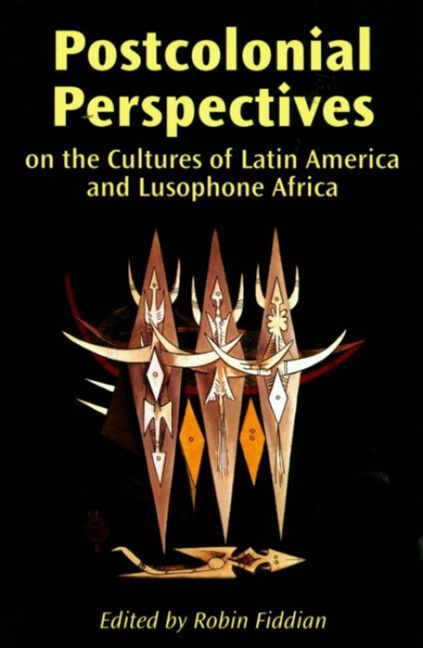Book contents
- Frontmatter
- Contents
- Preface
- Locating the Object, Mapping the Field: the Place of the Cultures of Latin America and Lusophone Africa in Postcolonial Studies
- Chapter One On Metropolitan Readings of Latin American Cultures: Ethical Questions of Postcolonial Critical Practice
- Chapter Two Ig/noble Barbarians: Revisiting Latin American Modernisms
- Chapter Three José Carlos Mariátegui: Culture and the Nation
- Chapter Four Doing Time in Peru: the Poetics of Multitemporality as Method for Cultural History
- Chapter Five America, Americanism and the Third World in the Work of Leopoldo Zea
- Chapter Six Fernando Ortiz's Transculturation: the Postcolonial Intellectual and the Politics of Cultural Representation
- Chapter Seven Caribbean Masks: Frantz Fanon and Alejo Carpentier
- Chapter Eight Colonial Crosswords: (In)voicing the Gap in Mia Couto
- Index
Chapter Seven - Caribbean Masks: Frantz Fanon and Alejo Carpentier
- Frontmatter
- Contents
- Preface
- Locating the Object, Mapping the Field: the Place of the Cultures of Latin America and Lusophone Africa in Postcolonial Studies
- Chapter One On Metropolitan Readings of Latin American Cultures: Ethical Questions of Postcolonial Critical Practice
- Chapter Two Ig/noble Barbarians: Revisiting Latin American Modernisms
- Chapter Three José Carlos Mariátegui: Culture and the Nation
- Chapter Four Doing Time in Peru: the Poetics of Multitemporality as Method for Cultural History
- Chapter Five America, Americanism and the Third World in the Work of Leopoldo Zea
- Chapter Six Fernando Ortiz's Transculturation: the Postcolonial Intellectual and the Politics of Cultural Representation
- Chapter Seven Caribbean Masks: Frantz Fanon and Alejo Carpentier
- Chapter Eight Colonial Crosswords: (In)voicing the Gap in Mia Couto
- Index
Summary
Early in Alejo Carpentier's novel El siglo de las luces (1962), Esteban, a young late eighteenth-century Cuban intellectual intoxicated with the rhetoric of the French Revolution by his French mentor, Victor Hugues, has the opportunity to visit Paris. As Roberto González Echevarría has demonstrated, this section of the novel swarms with deliberate, half-masked anachronisms. Carpentier coyly dresses up the Paris of the early 1790s in homage to the Paris of the 1920s and 1930s, where the Cuban novelist had undertaken his own intellectual apprenticeship. As Esteban walks the eighteenthcentury streets, descriptions of Daliesque paintings mingle with references to automatic writing. Yet, arguably, González Echevarría overlooks one anachronistic allusion crucial to the deliberately inverted perspective through which Carpentier's novel assesses the French Revolution in terms of its political and intellectual impact on the Caribbean. Visiting a masonic lodge which serves as a meeting place for foreign supporters of the revolution, Esteban is pleased to discover that this establishment appears to have been liberated from racial prejudice:
No podía decirse, por lo demás, que no reinara una sana mentalidad democrática donde un Carlos Constantino de Hesse-Rotenburg trataba familiarmente al patriota de color quebrado, venido de la Martinica.
The evidence suggesting that this Martinican friend of the Revolution might represent a respectful nod towards Frantz Fanon, though circumstantial, is by no means trivial. Like Esteban, Carpentier had experienced the tutelage of his own French intellectual mentorcum- father-figure, André Breton, whose influence, like that of Victor Hugues in the novel, had proved at first illuminating but ultimately distorting, patronizing and oppressive. In 1947, Breton—whom Carpentier had by then rejected as his mentor—published a preface to the first postwar edition of Cahier d'un retour au pays natal (1939), a groundbreaking suite of polemical poems and lyrical reflections by Fanon's mentor, the Martinican poet Aimé Césaire. Césaire rooted his perceptions within the context of a distinctly Afro-Caribbean history of slavery: ‘J'accepte. / J'accepte. / et le nègre fustigé qui dit: “Pardon mon maître” / et les vingt-neuf coups de fouet légal …’ (52).
- Type
- Chapter
- Information
- Publisher: Liverpool University PressPrint publication year: 2000



